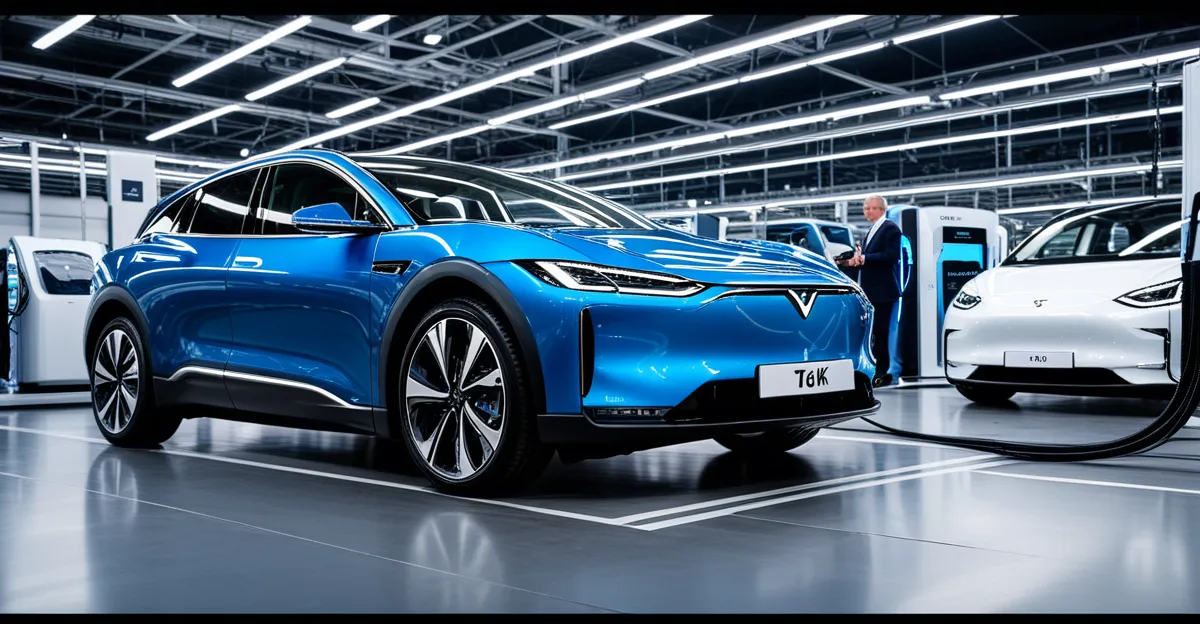Effects of EV Adoption on UK Automotive Industry
The EV adoption UK landscape is rapidly evolving, significantly affecting the UK automotive industry. Current trends show an accelerating shift toward electric vehicle production, fueled by growing consumer demand and stringent emissions regulations. This momentum suggests a trajectory where electric vehicle market share is expected to increase considerably over the next decade.
Traditional vehicle manufacturing is facing immediate impacts, with many legacy automakers reducing fossil fuel-based vehicle production. In contrast, investments in electric vehicle manufacturing facilities are surging. This transition necessitates retooling plants and adopting new technologies compatible with EV assembly.
Have you seen this : How is the Evolution of Electric Vehicles Reshaping the UK Automotive Industry?
Forecasted shifts indicate that UK automakers will see electric vehicles dominate production volume, possibly surpassing conventional cars within a few years. Market penetration of EVs will reshape supply chains, supplier relationships, and workforce composition in the industry.
Understanding electric vehicle market trends is essential for grasping these effects. As EV adoption UK expands, the UK automotive industry must align its manufacturing capabilities accordingly, balancing the decline of traditional models with the growth of electric alternatives. This balance is crucial for maintaining competitiveness and sustainability in the evolving market.
This might interest you : Is the UK Automotive Industry Ready for the Electric Vehicle Revolution?
Economic and Employment Implications
The EV adoption UK shift is transforming automotive manufacturing jobs profoundly. As traditional combustion vehicle production declines, roles focused on engine assembly and exhaust systems reduce. Conversely, demand grows for specialists in electric motor assembly, battery integration, and software diagnostics. This change results in a workforce realignment within the UK automotive industry.
Upskilling and retraining become paramount. Workers must acquire new expertise in battery technology, high-voltage systems, and digital manufacturing processes. Many companies have launched dedicated retraining programs to bridge skills gaps. This proactive approach mitigates job displacement while enhancing employee value in the evolving electric vehicle market.
The broader UK economy feels both benefits and challenges. Regions heavily reliant on traditional vehicle manufacturing face transitional strain. However, EV growth creates new job opportunities in plant modernization, battery factories, and component suppliers. Employment patterns shift from labor-intensive roles towards higher-tech positions, valuing adaptability.
Overall, employment impact is multifaceted: a decline in some traditional jobs contrasts with growth in innovative sectors. Understanding these dynamics is critical for policymakers and industry leaders to support a resilient workforce and harness economic advantages tied to the accelerating EV adoption UK movement.
Supply Chain Transformation and Battery Production
The EV supply chain in the UK is undergoing a fundamental transformation driven by the surge in EV adoption UK. Central to this shift is the urgent need for battery manufacturing UK capacity expansion. Batteries represent a significant portion of electric vehicle costs, making localized production essential to reduce delays and costs.
However, establishing a fully integrated battery manufacturing UK ecosystem faces hurdles. Securing critical raw materials, such as lithium, cobalt, and nickel, is a major challenge due to global supply constraints and geopolitical factors. The UK must develop robust sourcing strategies and explore recycling initiatives to ensure steady raw materials supply.
Supplier relationships are also evolving. Traditional component suppliers must pivot or collaborate with battery specialists, fostering new partnerships across the EV supply chain. This realignment ensures a stable flow of innovative battery technologies and parts essential for EV performance and safety.
Overall, the UK automotive industry’s competitiveness hinges on efficient battery manufacturing UK and a resilient, flexible EV supply chain. Meeting these requirements will mitigate risks associated with dependence on overseas suppliers and strengthen domestic production capabilities vital to sustaining the EV adoption UK momentum.
Technological Innovation and Infrastructure
The UK automotive industry is embracing cutting-edge automotive technology to meet the demands of increasing EV adoption UK. Advanced automation and digital manufacturing techniques enable precision assembly, improve efficiency, and reduce production costs in electric vehicle manufacturing. Robotics and AI-driven quality control are becoming standard, facilitating faster adaptation to evolving electric vehicle market trends.
A crucial component of this innovation wave is the expansion of EV infrastructure. The UK government and private sector are investing heavily to increase charging station availability nationwide, addressing consumer range anxiety and supporting the shift to electric mobility. Enhanced infrastructure supports not only urban centers but also rural areas, ensuring broad accessibility for EV owners.
Research and development (R&D) efforts are intensifying, focusing on battery technology advancements and lightweight materials to improve range and performance. These innovations provide UK automakers with a competitive edge in the global market, aligning with sustainability goals and regulatory requirements.
Together, infrastructure upgrades and manufacturing advancements drive the UK’s transition toward a resilient, future-ready automotive sector, reinforcing its position within rapidly shifting electric vehicle market trends.
Government Policies and Regulatory Environment
Government action plays a pivotal role in accelerating EV adoption UK and reshaping the UK automotive industry. The UK government has introduced stringent automotive regulations targeting emissions reductions, effectively phasing out sales of new petrol and diesel vehicles by 2030. These regulations compel automakers to increasingly prioritize electric vehicle production.
Fiscal incentives form a cornerstone of policy support. Subsidies for consumers, like grants for EV purchases and reduced vehicle taxes, stimulate demand. Concurrently, manufacturers benefit from grants and tax relief aimed at encouraging investment in electric vehicle technologies and production facilities.
Upcoming policies further tighten emissions standards and promote zero-emission vehicle infrastructure development. Such regulatory pressure drives innovation and influences manufacturers’ strategic planning. For example, stricter targets on fleet emissions incentivize companies to accelerate electrification.
The UK’s regulatory environment ensures a clear roadmap for the transition, providing certainty to both consumers and industry players. This policy framework is essential to sustain momentum in electric vehicle market trends and maintain the UK’s competitive position in the global automotive sector. Understanding these policies helps stakeholders align their actions with long-term sustainability and economic goals.





